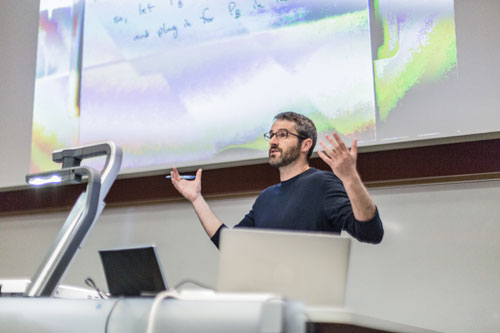Overview of Economics
 Perhaps the most important benefit of studying economics is learning how to “think like an economist.” Economists study how scarce resources are allocated so that well-being is maximized. Whether the resource that is being allocated is income, time or a precious commodity, there is always some tradeoff involved. Individuals, businesses and governments face these tradeoffs in countless ways everyday. The most important thing students learn from studying economics is how to identify, measure and understand the essential elements of this tradeoff.
Perhaps the most important benefit of studying economics is learning how to “think like an economist.” Economists study how scarce resources are allocated so that well-being is maximized. Whether the resource that is being allocated is income, time or a precious commodity, there is always some tradeoff involved. Individuals, businesses and governments face these tradeoffs in countless ways everyday. The most important thing students learn from studying economics is how to identify, measure and understand the essential elements of this tradeoff.
About the Program
Why Economics at UC Merced?
There are many good schools offering degrees in economics, but there are some real advantages to enrolling at UC Merced. Here are some of the distinctive opportunities at UC Merced:
- You will work with and be taught by tenure-track professors for most of your classes, instead of teaching assistants or part-time lecturers, even when you are a freshman.
- We offer small classes relative to other state schools.
- Our faculty regularly hire talented undergraduates to assist in their research to a much greater degree than other state universities.
- Our faculty are actively involved in research that is important and very relevant to today’s world, and we love sharing that research with students.
- We have a low teacher-student ratio in economics and we take pride in getting to know our students. This makes for a better learning environment and allows us to write much more detailed recommendation letters and advise students on their careers in a more personalized way.
Areas of Research
- Sustainability, Biofuels, Land Use, and Crop Index Insurance
- Local Politics
- Economics: Impact of Education on Income
Potential Careers*
- Economist
- Accountant
- Auditor
- Budget analyst
- Logistician
- Economic consultant
- Actuary
- Credit analyst
- Financial analyst/manager
- Policy analyst
- Management consultant
- Business reporter
- Financial advisor
- Statistician
* Please Note: Some of these carers might require education beyond a Bachelor's degree.
Learning Outcomes
Students graduating from the Economics program demonstrate the following:
- Describe the underlying economic incentives and tradeoffs associated with the decisions made by individuals, firms, organizations, institutions and governments.
- Apply economic concepts in analyzing policy debates and evaluating policy outcomes.
- Design and conduct research that can inform managerial and economic policymaking by collecting, analyzing and interpreting data using relevant software.
- Demonstrate critical, evidence-based, thinking about economic phenomena, whether encountered in coursework or in media reports, so that students can evaluate the accuracy of hypotheses presented.
- Communicate clearly and cogently in written and oral form in academic and professional environments.

